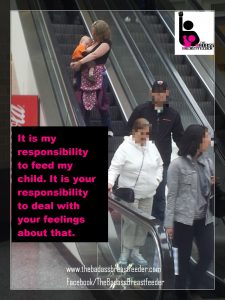One of the most important things to maintaining a breastfeeding relationship is unconditional support from your partner. Many women are lucky to have this support, but there are still a lot of women out there who struggle with criticism or friction from their partners. Breastfeeding in public can be difficult for some partners to accept because they may feel that their wife’s breasts are for their eyes only. They might also get teased by their friends for having a wife who wants to breastfeed since this is not very common in the U.S. They might feel if you are out in public alone that they can’t protect you from the harshness of the world that they suspect you will encounter. Our partners, especially men, are at the same mercy of societal norms and politics as women are.
Whatever it is that your partner is struggling with, it is important to remember that this is wrapped up in their own personal insecurities and concerns. It is not a lack of love for you or your baby. They need love and support as much as you do. Having these conversations as early as possible is vital to a successful breastfeeding relationship. Once your child is in your arms and you are learning the ins and outs of parenting it can be difficult to work this out. It’s never too late to work on this challenge, of course, but try addressing the problem before it gets out of hand. If you suspect that your partner is not supportive of you breastfeeding in public, try to have a conversation. You will more than likely need to have more than one conversation. You will save yourself some stress if you see it as a dialogue that will continue over time. Here are some tips to a successful breastfeeding dialogue.
• Pick a time when your partner is open and relaxed. Try not to pounce on them right when they walk through the door. This will throw them off guard and create more resistance. Try the weekend or evening when there is more time to spare and pressure is off.
• You may have already become an expert in your partner’s body language. If you begin a conversation and can pick up on signs of stress or annoyance then try again later. Pushing the issue may just lead to resistance.
• Keep the conversation focused on your own needs. Blaming, name calling and a persistent “you do this, you do that” trend will get you nothing but walked away from.
• Try giving examples. Pick a time when you felt unsupported and describe what could have been done to make you feel more supportive. “I felt angry the other day when we were out to dinner and you asked me why I needed to breastfeed the baby here. I wonder if in the future you could compliment me on the things I do for our baby.”
• Ask what their feelings are and what you can do to help support them. If they seem to struggle, help them out by suggesting some concerns you suspect they have. “I wonder if you feel nervous about someone saying something negative to me.” “Do you feel embarrassed that your friends will see me breastfeeding?”
• As usual, no judging. Allow your partner to really be honest without any judgment. It’s the only way to work through it. Listen to your partner. Sometimes just being listened to without judgment or interruption solves most of the problem.
• End the conversation on a positive note. You don’t need to solve everything today. Having a positive conversation experience will encourage further conversations.
• Offer to provide your partner with information that discusses the benefits of breastfeeding on demand. Sometimes it helps to see it in black and white written by professionals. This can help some partners realize that this is not a lifestyle choice but an informed decision about your child’s physical and emotional health.
Family support
We pick our partners and we pick our friends, but we don’t get to pick our family. I hear a lot about women who are not supported and are even harassed by family in regards to their choice to breastfeed in public. I would like to give you some ideas about how to deal with this painful kind of criticism.
Raising a child today is much different than it was even 10 years ago. Today we have Facebook and other social media venues where we display photos, post our opinions and disclose our personal experiences. People know more about each other today, but have less face to face time to relate on a human level. It is easy to criticize and engage in arguments when we are seated behind our computers. People say things to us that they would never say to your face. This can add stress to those holiday get-togethers on top of the stress already there for having chosen a different parenting style than your parents chose.
All of the tips for starting a dialogue discussed above apply; however, you may find that this level of intimate conversation is not appropriate with your parents, cousins or grandparents. That is perfectly understandable and therefore you may choose to have a few rehearsed lines to recite when someone approaches you about breastfeeding. Neutral and non-confrontational are your best bet for keeping the flow and getting through that holiday season without causing more stress to the family relationships:
• “That worked well for you and this works well for us.”
• “Thank you for your concern, but we are very happy.”
It is important to remember that these people are likely expressing their insecurities or regrets about their own parenting choices. It can be threatening to see the child you raised venture so far from how they raised you.
• “You should be proud that you raised a strong enough person to venture from the norm and explore other parenting styles. I couldn’t have done it without the strength you instilled in me.”
Friend support
The transition from someone’s drinking buddy to someone’s mother is drastic and awesome. However, many women experience conflict when their values and priorities shift from their friends to the baby in their life. It is important to have unconditional support from your friends. These are people that you get to pick. These are the people that you get to choose to spend your time with. If you are having negative experiences it is important to express yourself using the tips for dialogue above. If you feel that you are not receiving the support you need to be successful as a mother then it may be time to think about what these people bring to your life. It is normal for things to shift drastically. These people may have been like family to you before motherhood and they may not now. Tell them what you need from them. Tell them how they can be a part of creating a positive environment for your child to grow up in. You may lose touch with friends and that is OK. They were an important part of your life.
Cutting Ties
Considering cutting ties with people can be a painful process, but your priority is motherhood and that is how it should be. You should not feel bad about your decision to create as positive an environment for you and your child as possible. If this is a road you are considering for family or friends then take time to think about it. Make decisions when you are calm and can think clearly about how this decision will affect the life if you and your child.
Mama Tribes
A Mama Tribe is a group of trusted women that you have bonded with through parenting. These are your closest friends and allies. These women can be hard to find if you are parenting outside of the norm. The internet is a valuable tool to help women who feel isolated find connection, but there is no substitute for face to face contact with like-minded mothers. Click here to find your local moms.
Further Reading:
http://naturo-mommy.blogspot.com/2012/11/breastfeeding-in-holiday-season-ten.html
http://www.wikihow.com/Practice-Nonviolent-Communication
TO START DAY 6 OF THIS COURSE CLICK HERE.













